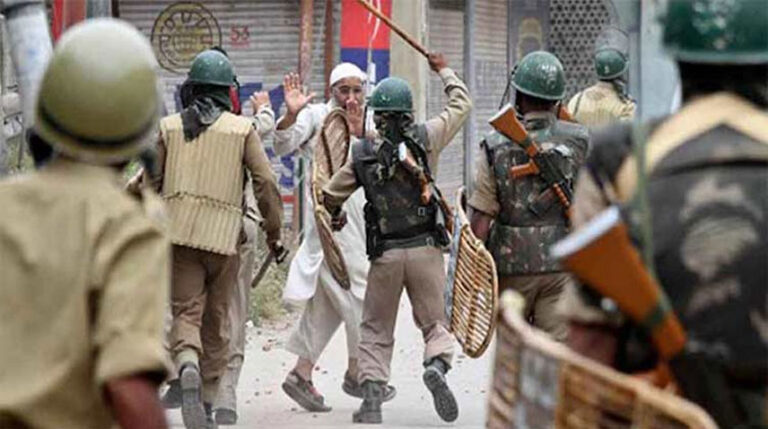Since the bloody partition of 1947, the Muslim population across India and particularly in Kashmir, has faced systemic struggles. As India rose on the global stage as a growing economic and political power, the plight of its Muslim citizens has remained largely ignored, twisted, or weaponized by both Indian and international media. Today, under the leadership of Narendra Modi and the Bharatiya Janata Party (BJP), the situation has got worse into open discrimination and suppression, fueling isolation and deepening an already fragile social divide.
A History of Broken Promises in Kashmir
The Kashmir conflict has been a flashpoint ever since independence. Despite UN-mandated resolutions calling for a public vote to determine the region’s future, India never honored this commitment. Instead, the Indian government subjected Kashmir’s Muslim-majority population to decades of military control and political manipulation. When Modi came to power in 2014, the repression intensified. In 2019, his government unilaterally revoked Article 370, stripping Kashmir of its autonomy without democratic consent. A brutal communication blackout, mass arrests, and violent crackdowns followed, revealing how far India’s government was willing to go to silence Kashmiri dissent.

The Radicalization Narrative: A Convenient Cover
After the Pulwama attack and other unrest, the Indian state and media quickly portrayed Muslims as the eternal “other,” treating them as radicals to fear rather than citizens to understand. Despite a lack of clear, verifiable evidence linking attacks directly to Pakistan or Kashmiri groups, mainstream narratives perpetuated the idea that Muslim militancy was the root cause. This narrative served a dual purpose: consolidating Hindu nationalist sentiment at home and deflecting attention from the government’s failures on economic and social fronts.
Commentators often cite radicalization but rarely address the root cause: the consistent denial of rights, identity, and dignity to Kashmir’s Muslims. The Indian government and media often frame civil unrest in Kashmir—driven by human rights violations, military occupation, and political disenfranchisement—as terrorism rather than a desperate struggle for autonomy and justice.
Muslims Across India: Victims of a Hindutva Agenda
Indian society marginalizes Muslims not only in Kashmir but across the entire country. Across India, Modi’s government has championed Hindutva ideology, promoting Hindu supremacy under the guise of nationalism. Laws targeting beef consumption, the anti-Muslim Citizenship Amendment Act (CAA), and “love jihad” conspiracies criminalize the very existence of Muslims in the public space. States governed by the BJP have passed ordinances against interfaith marriages, effectively branding Muslim men as predators.

This legislative onslaught is accompanied by street-level violence: lynchings over alleged cow slaughter, forced evictions, and targeted harassment. Muslims are reduced to political pawns in an environment increasingly hostile to religious diversity, all while the world watches silently.
Media’s Role in Demonizing a Community
Perhaps most devastating has been the role of both Indian and international media in reinforcing stereotypes. Stories of Muslim victimhood, systemic discrimination, and violence seldom make international headlines unless they can be tied to terrorism. This selective amplification distorts reality and pushes Muslims deeper into the margins. In the eyes of the media, Muslims are often portrayed as either dangerous extremists or passive victims, rarely as individuals demanding basic human rights.
This portrayal fuels a vicious cycle: as Muslims are vilified, public support for discriminatory policies grows, providing further political capital to Hindu nationalist leaders.
A Global Silence That Speaks Volumes
Despite clear evidence of human rights abuses, the international community largely remains silent. Strategic interests, economic partnerships, and geopolitical rivalries outweigh the lives and dignity of millions. For global media outlets, Muslim suffering often remains an inconvenient footnote rather than a central concern.
This silence is dangerous. It signals that democracy can coexist with apartheid-like policies if economic benefits are high enough. It legitimizes bigotry dressed as nationalism and normalizes the gradual erosion of human rights in the world’s largest democracy.
A Call to Witness and Action
The struggles of Muslims in India and especially in Kashmir are not isolated issues. They are symptomatic of a deeper, deliberate transformation of India into a majoritarian state where minorities are second-class citizens. Radicalization, where it occurs, is not the disease, it is a symptom of long-festering injustice and alienation.
It is time for the world, and especially international media, to confront this uncomfortable reality. Ignoring the plight of India’s Muslims does not make it disappear, it makes it worse. For any country aspiring to global leadership, human rights must not be optional. They must be fundamental.


